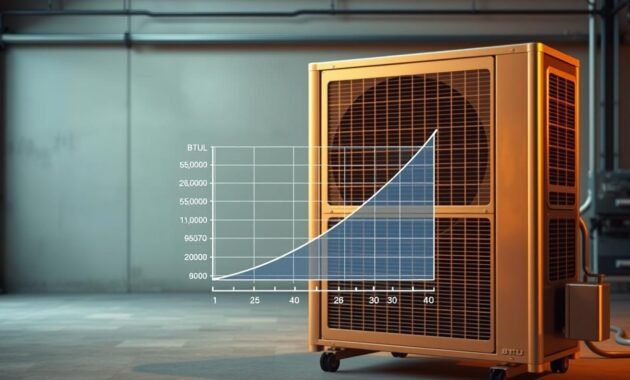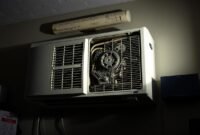Understanding the air conditioner BTU meaning can change the game for keeping your home cool. Many homeowners struggle to pick the right cooling power. They end up wasting money on systems that don’t quite do the job.
The btu definition hvac is actually quite simple. BTU stands for British Thermal Unit, which measures an air conditioner’s cooling power. It’s like trying to cool a room without knowing how much heat your AC can remove. It’s really frustrating.
I’ll help you understand BTU ratings. This way, you can choose the perfect air conditioner. It will keep you comfortable without costing too much. Get ready to become a cooling expert and make smart choices for your home’s comfort.

What Does BTU Mean in Air Conditioning?
Understanding BTU is key when choosing air conditioning for your home. BTU stands for British Thermal Unit. It measures the cooling power of air conditioning systems.
Read also: What Should Humidity be in House with Air Conditioning Systems?
So, what does BTU mean for cooling? It’s the energy needed to warm one pound of water by one degree Fahrenheit. For air conditioning, it shows how much heat an AC can remove in an hour.
Decoding the BTU Energy Measurement
Think of BTUs as a power rating for your air conditioner. The higher the BTU, the more cooling it offers. Here’s a quick guide:
- 1 BTU = Heat needed to raise 1 pound of water 1 degree Fahrenheit
- AC BTUs measure heat removal capacity per hour
- Typically ranges from 5,000 to 30,000 BTUs for home units
Choosing the right BTU is vital for cooling efficiently. Too little, and your room is too warm. Too much, and you waste energy and money. Always calculate your space’s cooling needs to find the right BTU.
Real-World BTU Application
A 12,000 BTU air conditioner can remove 12,000 units of heat every 60 minutes. It’s strong enough to cool a medium-sized room fast. Knowing this helps you decide on the right cooling for your space.
The Importance of BTU Ratings in Cooling Systems
When looking for an air conditioner, knowing about BTU ratings is key. The BTU rating shows how well your cooling system will work in your space.
Choosing the right AC BTU is vital for a good cooling experience. The wrong size can cause big problems:
- Inefficient cooling performance
- Higher energy consumption
- Increased utility bills
- Uncomfortable room temperatures
Finding the right BTU for your room is like solving a puzzle. A unit that’s too small will work hard and use a lot of electricity. On the other hand, a unit that’s too big will cool too fast, leading to temperature swings and poor humidity.
| Room Size | Recommended BTU Range | Potential Issues if Mismatched |
|---|---|---|
| 150-250 sq ft | 5,000-6,000 BTU | Inefficient cooling, high energy waste |
| 250-350 sq ft | 7,000-8,000 BTU | Uneven temperature distribution |
| 350-450 sq ft | 9,000-10,000 BTU | Excess moisture, frequent cycling |
By thinking about BTU ratings, you’ll get the best cooling, save on energy, and keep your home comfy.
Air Conditioner BTU Meaning: Essential Guidelines for Homeowners
Understanding air conditioner BTU meaning is key for homeowners. It helps cool your home efficiently and saves money. Here are the main points to help you make better cooling choices.
Impact on Energy Efficiency
Choosing the right BTU rating is like finding the perfect shoe size for your home. When your air conditioner fits your space just right, you save a lot on energy. A unit with the right BTU capacity works efficiently, using less energy.
- Proper BTU sizing minimizes electricity waste
- Reduces strain on your cooling system
- Prevents overcooling or undercooling
Relationship to Room Temperature Control
BTU ratings affect how well you can cool your home. The right size air conditioner keeps temperatures steady, making your home comfortable. Too small, and it can’t handle the heat. Too big, and it cools unevenly and raises humidity.
Connection to Operating Costs
Your air conditioner’s BTU rating is key to your long-term costs. A well-matched unit uses less energy, cutting down on your bills and maintenance. Always talk to HVAC experts to find the perfect BTU for your space.
- Lower energy consumption
- Reduced maintenance expenses
- Extended equipment lifespan
Knowing about air conditioner BTU meaning helps you make smart choices. It improves your home’s cooling and saves you money.
How BTU Capacity Affects Cooling Performance

BTU calculation for AC is key to air conditioning efficiency. It’s like the engine of a car, affecting cooling performance. The right BTU capacity is essential for optimal cooling and energy use.
Here’s what happens when BTU sizing is off:
- Undersized units struggle to reach desired temperatures
- Oversized units create uneven cooling and waste energy
- Perfectly sized units maintain consistent comfort
Many homeowners make mistakes with BTU calculations. A too-small AC unit runs all the time, raising electricity bills. On the other hand, an oversized unit cools too fast, leading to short cycling and poor humidity control.
Finding the perfect BTU match for your space is important. This involves considering room size, ceiling height, sunlight, and local climate. A professional can help find the exact BTU needs for best cooling and energy efficiency.
Understanding BTU capacity helps create a more comfortable and cost-effective cooling space in your home.
Calculating the Right BTU for Your Space
Choosing the right air conditioning system is more than picking a random unit. It’s about understanding how to calculate BTUs per square foot for comfort and energy savings. Let’s go through the steps to find the perfect BTU for your space.
From my HVAC experience, I know finding the right air conditioner size is key. The rule of thumb is 20 BTUs per square foot. But, this rule doesn’t fit everyone.
Square Footage Considerations
To figure out your AC needs, start with these steps:
- Measure the total square footage of the room
- Use an ac btu chart to match room size with the right BTU rating
- Remember, standard calculations assume 8-foot ceilings
Room-Specific Requirements
Each room has its own BTU needs:
- Kitchens need 4,000 extra BTUs because of heat from appliances
- Rooms with direct sunlight need a 10% BTU increase
- Add 600 BTUs for each person beyond two
Climate Zone Adjustments
Your location affects BTU needs. Homes in hot, humid places like Florida or Texas need more BTUs. Talking to local HVAC experts can help get your cooling just right.
Common Problems with Incorrect BTU Sizing
Getting the BTU sizing wrong can lead to cooling problems. I’ve seen many homeowners face issues due to incorrect BTU selection. It’s not a good experience.
It’s important to know what BTU means for AC to avoid these problems. An air conditioner that’s too small can make your home hot and uncomfortable. Here’s what happens when you choose the wrong size:
- Undersized units work too hard, never cooling your space enough
- Energy bills go up because the system can’t cool your home
- Your home stays too warm, even with the AC on all the time
On the other hand, an air conditioner that’s too big has its own issues. It cools your room too fast and then turns off. This leads to:
- Poor humidity control
- Uneven temperature in your home
- More wear and tear on your AC system
- Higher energy bills
Finding the right BTU size is key. It should be just right, not too big or too small. I suggest talking to a professional. They can help figure out the exact BTU your space needs. They’ll consider room size, sunlight, and local weather.
Read also: How to Remove Musty Smell from Air Conditioner Units
BTU to Square Footage Conversion Guide
Understanding btu calculation for ac is key for a perfect indoor climate. The link between BTUs and square footage is more than just math. It’s a science that ensures your space cools just right.
The usual rule for ac btu needs is about 20 BTUs per square foot. But, many factors can change what you really need.
Standard Conversion Rates
Here’s a quick look at BTU calculations for different room sizes:
- 150-350 sq ft: 5,000-8,000 BTUs
- 350-550 sq ft: 8,000-12,000 BTUs
- 550-700 sq ft: 12,000-14,000 BTUs
- 700-1,000 sq ft: 14,000-18,000 BTUs
Adjustment Factors for Special Conditions
Real-world btu calculation for ac goes beyond just square footage. It’s important to think about these key factors:
- Sunlight exposure: Add 10% BTUs for rooms with direct sunlight
- Ceiling height: Increase BTUs for rooms with ceilings higher than 8 feet
- Kitchen spaces: Add 4,000 BTUs due to heat-generating appliances
- Occupancy: Include 600 BTUs per additional person
Climate zones also affect ac btu needs. Homes in very hot areas might need up to 30% more cooling than those in milder climates.
Energy Consumption and BTU Ratings

Understanding how BTU ratings relate to energy use is key for smart cooling choices. The energy your air conditioner uses depends on more than just cooling power. It’s about a mix of factors.
Higher BTU units usually need more electricity. It’s like a car’s engine: bigger engines use more fuel. Your air conditioner works the same way – more BTUs mean more energy to cool your space.
- A 5,000 BTU unit might use 450-500 watts
- A 12,000 BTU unit could consume 900-1,200 watts
- Larger units require more electrical input
But, energy efficiency isn’t just about BTU numbers. The Seasonal Energy Efficiency Ratio (SEER) is also very important. A unit with fewer BTUs but high efficiency can outperform a less efficient, more powerful one.
Choosing the right air conditioner is about finding the right balance. Look beyond BTU ratings and consider the unit’s overall efficiency. This can help you save on electricity bills.
Understanding BTU Ratings for Different AC Types
Choosing the right air conditioning system is key. It depends on knowing BTU ratings for different types. Each type has its own features that fit various cooling needs.
Let’s look at the BTU ranges for different air conditioning systems. This will help you make a smart choice:
- Central Air Conditioning Systems
- Typical BTU range: 18,000 to 60,000 BTUs
- Best for whole-home cooling
- Ideal for larger residential spaces
- Ductless Mini-Split Systems
- BTU range: 9,000 to 36,000 BTUs
- Flexible zone cooling
- Perfect for targeted temperature control
- Window Air Conditioning Units
- BTU range: 5,000 to 12,500 BTUs
- Compact and affordable
- Suitable for small rooms or apartments
- Portable AC Units
- BTU range: 8,000 to 14,000 BTUs
- Highly mobile
- Good for temporary or supplemental cooling
When looking at an ac btu chart, remember it’s not just about cooling power. It’s about finding the right match for your space and cooling needs.
| AC Type | BTU Range | Best Application |
|---|---|---|
| Central AC | 18,000 – 60,000 | Entire Home Cooling |
| Mini-Split | 9,000 – 36,000 | Zone or Room Cooling |
| Window Unit | 5,000 – 12,500 | Small Spaces |
| Portable AC | 8,000 – 14,000 | Flexible Cooling |
Pro tip: Always talk to an HVAC expert to find the best air conditioning system for you. The right BTU rating can save you money and make your home more comfortable.
The Role of BTU in Modern Energy-Efficient Systems
Technology keeps getting better, making air conditioning smarter and more efficient. Now, air conditioning systems are not just coolers. They are smart climate control solutions that save energy and keep us comfortable.
Modern air conditioning has changed how we see BTU ratings. These advanced systems have features that go beyond just cooling.
Latest Technology Advancements
I’ve seen big changes in AC technology that are changing home cooling:
- Artificial intelligence-powered temperature control
- Adaptive learning algorithms for personalized comfort
- Real-time energy consumption tracking
- Cloud-connected climate management systems
Smart Features and BTU Optimization
Smart air conditioning systems use advanced sensors and connectivity to better use BTU. These smart units can:
- Automatically adjust cooling based on occupancy
- Predict and respond to weather changes
- Provide detailed energy usage insights
- Enable remote control through smartphone apps
By using machine learning and IoT, modern air conditioners are making cooling more efficient and personal. The future of home temperature control is here, making saving energy easier and smarter than ever.
Conclusion
Understanding air conditioner BTU meaning is key to cooling your home well. We’ve seen how these units are vital for the perfect indoor climate. They play a big role in keeping your home comfortable.
The right BTU rating is about more than just temperature. It’s about finding the right balance between comfort, saving energy, and saving money. Choosing the right air conditioning system means your home stays cool without costing too much.
Today’s cooling technology has changed how we think about BTUs. With smart features and advanced systems, we can control our home’s temperature better than ever. Knowing about BTU ratings helps you make choices that save you money and keep you comfortable.
When picking an air conditioning system, remember BTUs are your guide to the perfect indoor space. Cool your home smartly and efficiently by focusing on these important energy measurements.


